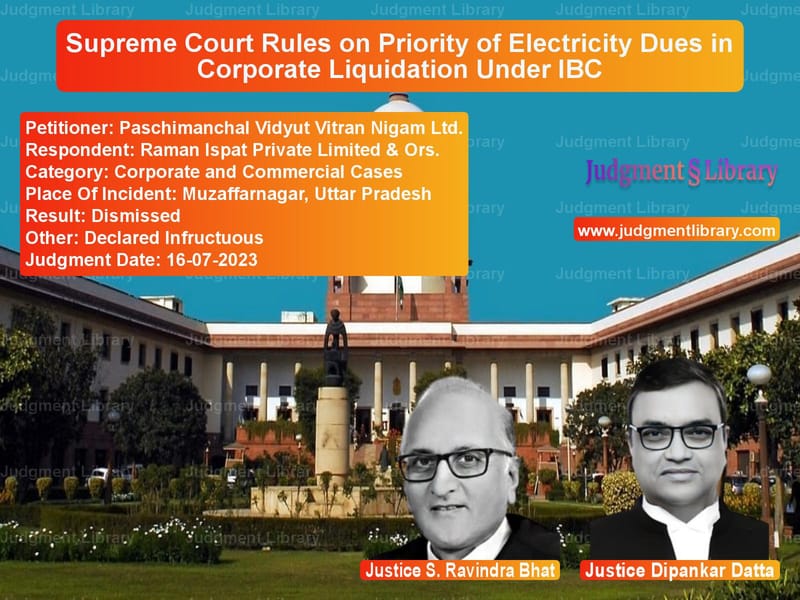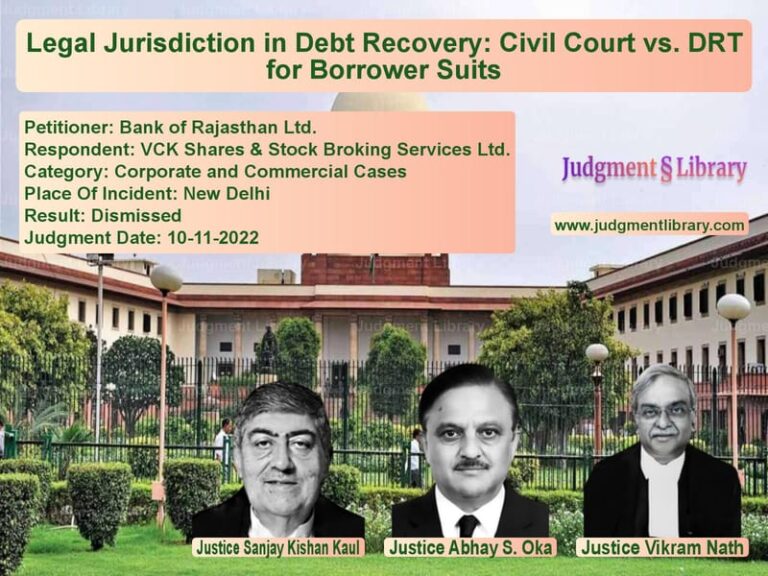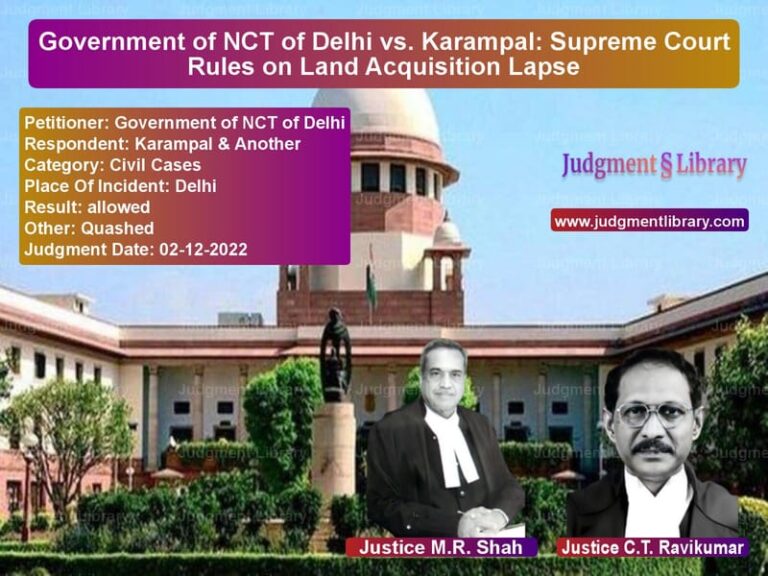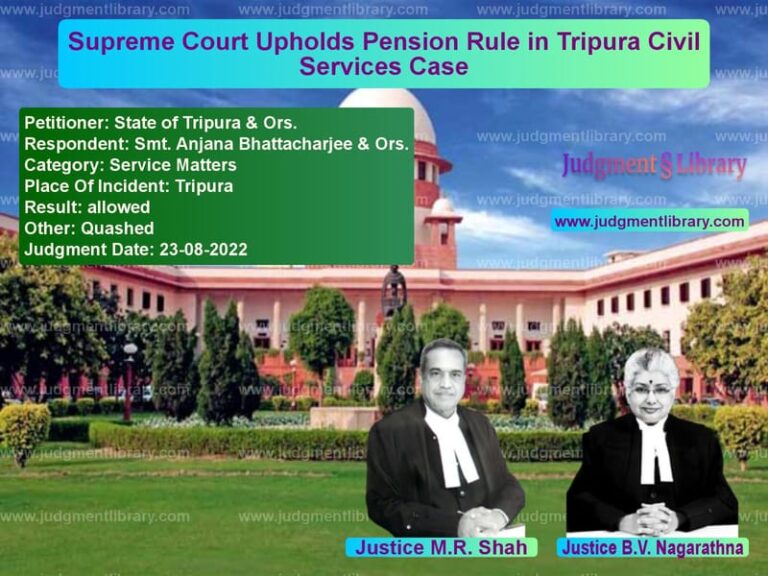Supreme Court Rules on Priority of Electricity Dues in Corporate Liquidation Under IBC
The Supreme Court of India recently delivered a significant judgment in Paschimanchal Vidyut Vitran Nigam Ltd. vs. Raman Ispat Private Limited & Ors. The case revolved around the conflict between the Insolvency and Bankruptcy Code (IBC), 2016 and the Electricity Act, 2003, particularly regarding the priority of electricity dues in the liquidation process.
Background of the Case
Paschimanchal Vidyut Vitran Nigam Limited (PVVNL), a power distribution company, had entered into an agreement with Raman Ispat Private Limited (the corporate debtor) on February 11, 2010, for the supply of electricity. A key clause in the agreement stated that electricity dues would be a charge on the assets of the company. However, when the corporate debtor defaulted on payments, PVVNL sought to recover its dues by attaching the debtor’s property.
Meanwhile, insolvency proceedings were initiated against the corporate debtor under the IBC. When no resolution plan was approved, the company entered liquidation. The liquidator sought to sell the company’s assets, but PVVNL objected, claiming a secured interest in the property due to its electricity dues.
Proceedings Before NCLT and NCLAT
The National Company Law Tribunal (NCLT), Allahabad, directed the District Magistrate and Tehsildar, Muzaffarnagar, to release the attached property so that it could be sold as part of the liquidation process. NCLT held that PVVNL was an operational creditor under the IBC and that it could recover its dues only as per the waterfall mechanism outlined in Section 53 of the IBC.
PVVNL challenged this order before the National Company Law Appellate Tribunal (NCLAT), but its appeal was dismissed. The company then approached the Supreme Court.
Key Legal Issues
- Whether the Electricity Act, 2003 has an overriding effect over the IBC in matters related to electricity dues.
- Whether electricity dues constitute a secured interest in the liquidation process.
- Whether PVVNL should be treated as a secured operational creditor or a government creditor under Section 53 of the IBC.
Arguments by the Appellant (PVVNL)
PVVNL, represented by Pradeep Mishra, contended that:
- The Electricity Act, 2003 has an overriding effect over all other laws, including the IBC, due to its non-obstante clauses in Sections 173 and 174.
- The agreement with the corporate debtor explicitly stated that electricity dues would be a charge on the company’s assets, making it a secured creditor.
- Under the Uttar Pradesh Electricity Supply Code, 2005, electricity dues are recoverable as arrears of land revenue, which grants them a priority status.
- Section 53 of the IBC should not apply to PVVNL as it does not create a statutory charge for government dues.
Arguments by the Respondent (Liquidator)
The liquidator, represented by Arvind Kumar Gupta, argued that:
- PVVNL’s claim should be categorized as an operational debt and should be distributed according to the waterfall mechanism in Section 53 of the IBC.
- Electricity dues are not secured debts unless explicitly registered under the Companies Act.
- The IBC’s non-obstante clause in Section 238 overrides the provisions of the Electricity Act.
- PVVNL had failed to register a charge under Section 77 of the Companies Act, making its claim as a secured creditor invalid.
Supreme Court’s Observations and Ruling
The Supreme Court, comprising Justices S. Ravindra Bhat and Dipankar Datta, upheld the NCLAT’s decision and ruled in favor of the liquidator.
1. IBC Overrides the Electricity Act
The Court ruled that the IBC prevails over the Electricity Act in case of conflict. It noted:
“Section 238 of the IBC has a broad overriding effect over other statutes, including the Electricity Act. Once a company enters liquidation, the priority of claims is determined strictly by the waterfall mechanism in Section 53.”
2. PVVNL is an Operational Creditor
The Court held that electricity supply falls within the definition of operational debt under the IBC. PVVNL’s claim was treated as an operational debt, not as a secured claim.
3. Electricity Dues Do Not Create a Security Interest
The Supreme Court emphasized that for a creditor to be considered secured, it must have a registered charge on the corporate debtor’s assets. The Court observed:
“Electricity dues, even if described as a ‘charge’ in a supply agreement, do not automatically create a security interest unless registered as required by law.”
4. PVVNL Must Claim Dues Under IBC’s Waterfall Mechanism
The Court ruled that PVVNL could recover its dues only as per the priority set under Section 53 of the IBC. It stated:
“All creditors, including statutory creditors, must participate in the liquidation process and cannot claim priority outside the IBC.”
Implications of the Judgment
This ruling has major implications for creditors and companies undergoing insolvency:
- IBC’s primacy: The judgment reaffirms that the IBC prevails over sector-specific laws, ensuring uniformity in insolvency proceedings.
- Electricity dues are operational debts: Power distribution companies cannot claim secured status for unpaid electricity bills.
- Secured creditors must register their charges: Creditors must ensure that security interests are properly registered under the Companies Act.
- Government dues have limited priority: Even statutory claims must be resolved under the waterfall mechanism of the IBC.
Final Judgment
The Supreme Court dismissed PVVNL’s appeal and directed the liquidator to proceed with the sale of the corporate debtor’s assets. PVVNL was directed to claim its dues as an operational creditor in the liquidation process.
Petitioner Name: Paschimanchal Vidyut Vitran Nigam Ltd..Respondent Name: Raman Ispat Private Limited & Ors..Judgment By: Justice S. Ravindra Bhat, Justice Dipankar Datta.Place Of Incident: Muzaffarnagar, Uttar Pradesh.Judgment Date: 16-07-2023.
Don’t miss out on the full details! Download the complete judgment in PDF format below and gain valuable insights instantly!
Download Judgment: paschimanchal-vidyut-vs-raman-ispat-private-supreme-court-of-india-judgment-dated-16-07-2023.pdf
Directly Download Judgment: Directly download this Judgment
See all petitions in Bankruptcy and Insolvency
See all petitions in Corporate Compliance
See all petitions in unfair trade practices
See all petitions in Judgment by S Ravindra Bhat
See all petitions in Judgment by Dipankar Datta
See all petitions in dismissed
See all petitions in Declared Infructuous
See all petitions in supreme court of India judgments July 2023
See all petitions in 2023 judgments
See all posts in Corporate and Commercial Cases Category
See all allowed petitions in Corporate and Commercial Cases Category
See all Dismissed petitions in Corporate and Commercial Cases Category
See all partially allowed petitions in Corporate and Commercial Cases Category







